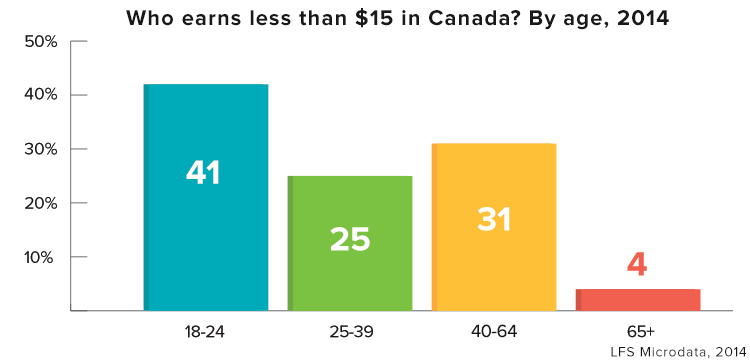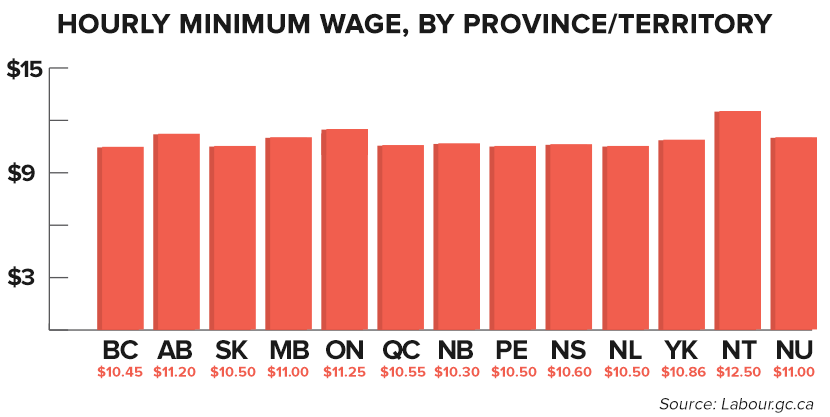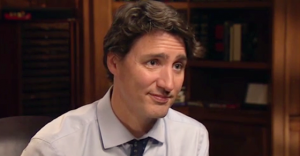
VIDEO: Justin Trudeau told a struggling worker he’s not sure about raising the minimum wage
"Maybe everything just gets more expensive or we have jobs leaving."
What does Prime Minister Justin Trudeau think about raising the minimum wage?
During a series of interviews with ordinary Canadians aired on CBC Sunday night, Trudeau shared his reservations about provincial initiatives to raise the minimum wage, telling a struggling, low-wage worker he questions if that means “everything just gets more expensive or we have jobs leaving.”
Neil Piercey was one ‘ordinary Canadian’ who got an opportunity to grill Trudeau.
Piercey is a 58-year-old worker from London, Ontario who was laid off from a long-time, good paying manufacturing job, but now finds himself in a low-wage job and without a pension as he nears retirement.
In a clip that didn’t air during Sunday night’s broadcast, but was later uploaded to the web, Piercey asks the Prime Minister if he thinks it would be “a good idea to raise the minimum wage?”
Piercey was told the federal government only controls wages on certain industries that fall under federal jurisdiction (something Trudeau’s Liberals supported raising in 2014 before criticizing it during last year’s election campaign), but then Trudeau went a step further, sharing his thoughts about a few provincial initiatives to raise the minimum wage:
“A number of provinces are looking at raising the minimum wage across the board. There’s always a question of whether or not that has the impact that everyone would like to have. Maybe everything just gets more expensive or we have jobs leaving. We have to be very careful about that.”
Although Trudeau said there’s “no easy solutions” and added that “the possibility” of earning enough to live on is “something that Canada’s always done,” CBC’s Rosemary Barton noted after the broadcast that Trudeau’s message left the struggling manufacturing worker disappointed and “unsure about what will happen to him.”
He might also be disappointed in several problems with Trudeau’s questions about the effectiveness of raising the minimum wage:
1. Raising the minimum wage is highly unlikely to mean “jobs leaving”:
Trudeau wonders if raising the minimum wage could mean “jobs leaving” and relocating elsewhere?
The problem with that, according to the Canadian Centre for Policy Alternatives, is most minimum wage jobs are concentrated in the service industry, so it doesn’t make sense to ship those kinds of jobs to places with lower wages:
“The problem with this argument lies in the kinds of jobs that pay at or near minimum wages. Some 70 percent of people employed at the minimum wage are in the retail, accommodation and food services industries. These kinds of businesses are, in the first place, not highly mobile. Moreover, an increase – even a substantial one – in the minimum wage would be paid by all businesses in these sectors, so that a capital flight would not be the result.”
2. There’s little evidence minimum wage has an impact on unemployment:
It’s also not clear that minimum wage increases means an increase unemployment. A literature review by the Canadian Labour Congress last year concludes there’s little evidence suggesting raising the minimum wage has an impact on unemployment:
“After examining the economic research available on the connection between unemployment and minimum wage increases, it is difficult to say with conviction how the two factors are related, if they are at all … According to The World Bank’s World Development Report 2013: Jobs, there is no known universal impact of the minimum wage on unemployment rates.”
Meanwhile, another CCPA study notes employment is driven more by “demand” than by the minimum wage, suggesting “fear of disemployment effects are overblown by those with a vested interest in keeping wages down.”
3. Raising the minimum wage has minimal impact on prices:
What about Trudeau’s concern that “maybe everything just gets more expensive”?
Numerous academic studies show raising the minimum wage has little impact on consumers, even if the full cost of paying workers were passed on to the customer. A 2011 University of California, Berkeley study estimated raising the minimum wage by approximately $5 would only lead to a 1.1% increase in the average Walmart shopper’s bill at the checkout line:
“Even if Walmart were to pass 100 percent of the wage increase on to consumers, the average impact on a Walmart shopper would be quite small: 1.1 percent of prices, well below Walmart’s estimated savings to consumers. This works out to $0.46 per shopping trip, or $12.49 per year, for the average consumer who spends approximately $1,187 per year at Walmart. This is the most extreme estimate, as portions of the raise could be absorbed through other mechanisms, including increased productivity or lower profit margins.”
Another study out of Purdue University estimated raising the minimum wage for McDonald’s workers by $8 would increase the price of a Big Mac by only 15 cents. And a recent study out of Cornell looking at the impact of minimum wage increases on the US restaurant industry over 20 years found it only translated into a 0.3% to 1.5% increase in costs for consumers.
Nearly half of Canadian minimum wage earners work at companies with 500+ employees. “Large corporations are also paying the bottom wage despite their profitability,” the CLC observes.
4. Older Canadians increasingly find themselves in low-paying jobs:
Piercey also told Trudeau it’s impossible for those earning a minimum wage to save for retirement, to which Trudeau responded by talking about investing in skills training so “people have a chance of getting beyond minimum wage jobs.”
But what good does that do for laid off workers approaching retirement?
Despite stereotypes of minimum wage workers as teenagers and students working part-time jobs, Statistics Canada data shows that in 2014, over one-third (35%) of workers in low-paying jobs were over 40 years in age:

5. Canada’s current minimum wages don’t equal a living wage:
How much money do you need to earn per hour just to make ends meet, anyway?
If you live in Toronto, you’ll need to earn $18.52 per hour to earn enough to live on. Across the country, the living wage varies between $20.68/hr in Vancouver, $18.15/hr in Calgary, $16.46/hr in Regina, $14.07/hr in Winnipeg, $14.15/hr in Windsor, or $20.10/hr in Halifax, to offer a few examples.
Compare that to hourly minimum wages across the country:

And it’s worth noting – after four decades, the minimum wage in Canada has increased by only one penny after inflation since 1975.
Photo: CBC.
Our journalism is powered by readers like you.
We’re an award-winning non-profit news organization that covers topics like social and economic inequality, big business and labour, and right-wing extremism.
Help us build so we can bring to light stories that don’t get the attention they deserve from Canada’s big corporate media outlets.
Donate




